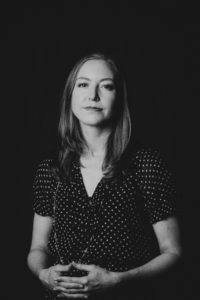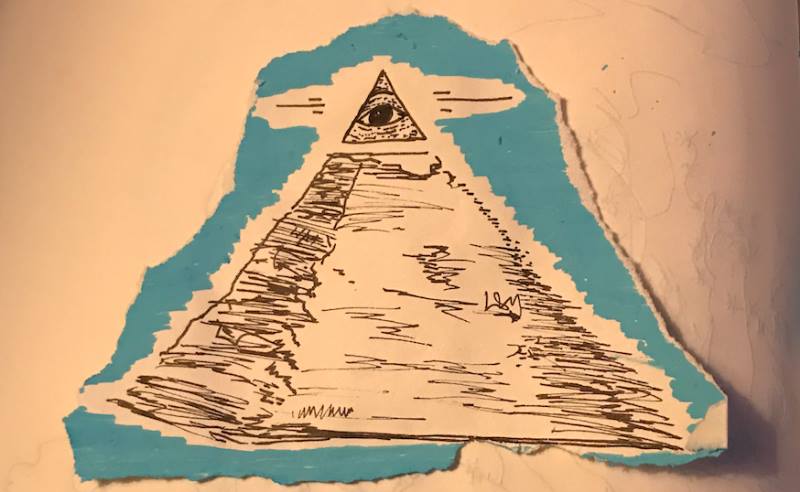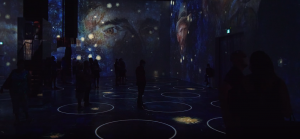Pictured above: Promotional image for L’Heure Bleue or The Blue Hour/Art: Gannon Reedy
Incisive and melancholy, the poems of writer Elisa Gabbert’s book L’Heure Bleue or the Judy Poems explore the mind of Judy, a character in Wallace Shawn’s play The Designated Mourner, that Gabbert portrayed in a 2013 production with Denver Poets’ Theater. I loved the collection and decided it should be adapted into a performance. Gabbert and I corresponded via email about death, disasters, poetry, theater and more.
・・・
“So the landscape pulsates, / supersaturated with meanings. / With meaningness.” You wrote that in a poem called “Commissioned” in a book called The French Exit. I love this—meaningness, the semblance of meaning. It’s such an earworm! What does it mean to be a writer in the United States in 2018?
Gabbert: I don’t think my essential role as a writer has changed so much as I feel my essential role as a human has changed. I think a lot about responsibility (what is my responsibility in/to the world?) and time (how much time do I have to carry out those responsibilities?). There’s a definite sense of urgency—climate change, the death of democracy, my own personal death, etc. I’m always aware when I’m wasting time. Like if I sat down to watch a movie and hated the first five minutes I’d just walk out. It’s not worth two hours of my life. I just don’t think I get as much pleasure from frivolity now (though I sometimes miss it), and I’m sure that comes out in my writing.
I just looked back at your question and I see that you asked what it means to be a writer here and now in general, not just for me. Ah well. I was once asked, “Concerning society, what do you think the poet’s role is/ought to be?” I said, “I’m not sure I think the poet has any particular role in society.” I do think writers should act morally, but same goes for teachers and doctors and senators.
In your essay “Magnificent Desolation” you write, “It’s the spectacle, I think, that makes a disaster a disaster. A disaster is not defined simply by damage or death count; deaths by smoking or car wrecks are not a disaster, because they are meted out, predictable. Nor are mass shootings generally considered disasters. A disaster must not only blindside us but be witnessed in public.” To what extent is humanity a disaster?
Gabbert: Oof. It kinda is? There’s this idea called the Great Filter, which is a response to the Fermi paradox, i.e., why is there no evidence of advanced life elsewhere in the universe? The Great Filter theory proposes that once civilizations advance enough to develop high-speed space travel or communications technology that would allow them to reach other planets, they’ve also developed technology that enables them to destroy themselves, via, say, global nuclear war, or a runaway AI.

So according to this theory, we haven’t heard from any advanced civilizations because they’ve all destroyed themselves already, just like we will. Interesting to note that because the universe is expanding, there will eventually be a point where everything’s so far apart, it would be academic anyway; there would be no way, even theoretically, for different civilizations to reach each other or even know of each other’s existence. So, yeah, I do kind of feel like humanity is on the brink of destroying itself, but brinks are relative here; after the asteroid hit, it took a long time for the dinosaurs to die.
Some people fetishize the apocalypse under the assumption that it’s a discrete event of spectacular violence. This thinking is flawed. It lacks awareness of the processes toward “the end,” the fact that many “ends” have already occurred and that more are on the way. Do you crave the end that’s after the brink?
Gabbert: God no, I’m terrified. I don’t want to see what the world will become in the next thirty to fifty years. My fantasy death is ground zero in the asteroid strike.
What is Denver Poets’ Theatre?
Gabbert: That’s the name we gave to our little ersatz theater company for the production of The Designated Mourner. There were just three of us and we only did one play. We rehearsed it for over a year (many bottles of red wine were consumed) and eventually did seven or eight shows. We always meant to do more, but things got in the way. Long live Denver Poets’ Theater.
I’d love to learn more about your rehearsal and performance process. I read that you performed the play in different venues. Was there any staging involved? Did you direct each other?
Gabbert: Our rehearsals started off more like close-readings. We’d sit around our dining room table reading and talking about the play and what it meant. John [Cotter] was technically the director (originally, he wanted to cast another Howard, but he ended up playing Howard himself); that said, we did sort of all direct each other. I had the least theater experience by far, though. God, it was so hard! I cried after rehearsal more than once. Aaron [Angello] used to say that it drove him crazy when people suggested the hardest part of acting was memorizing the lines because usually, that’s the simplest, stupidest part, but with this play, the memorization of these 10-page-plus monologues really was one of the hardest parts. Once we finally knew it more or less by heart, we did a series of private shows for audiences of around eight to ten people. Mostly we did them in living rooms. [Cotter] had always envisioned doing it as a “living room play.” We’d bring a bag of props and set up shop. We didn’t charge but we asked for a suggested donation to help cover the rights fee.
What drew you to The Designated Mourner? How have your impressions of the play changed since you put it up in front of an audience?
Gabbert: At first, nothing! My husband was the Wallace Shawn fan. I just wanted to be in a play. But of course, I wouldn’t have written a book based on it if I didn’t feel we were interested in a lot of the same ideas, like the construction of the self, the essential flimsiness of it… Actually, I used a line from The Designated Mourner as an epigraph for The Self Unstable, my previous book.
I’m not sure that my thoughts on the play have changed much, but I do think it demands to be seen as a play, not as a movie. I thought the movie version was kind of unwatchable? I think the play demands the level of intimacy that was especially possible in small spaces with small audiences. Judy is a very challenging character and it was very effective to be able to make and hold eye contact with people in the audience while delivering her lines. I’ve always loved the way plays force an interaction between the actors and the audience, such that when you see a bad play, as an audience member, you almost feel implicated, like it’s partly your fault.
I remember that epigraph from The Self Unstable. When I was preparing my questions for you I thought I was going to ask a question about your use of theatrical “acts” to divide the sections of that book. It turns out you didn’t actually divide it by acts, but by memorably-titled sections. This non-existent move was one of the things I admired most about the book! Maybe it’s because “First Person Shooter: Games & Leisure” sounds like an act out of Who’s Afraid of Virginia Woolf? Whatever the case, I’m interested in your relationship with theater. Besides L’Heure Bleue do you think your writing as a whole has any theatrical influences?
Gabbert: If it does, I’m not aware of it! But then when are people ever fully aware of their artistic influences? One funny thing about L’Heure Bleue is that I wanted it to actually look a little like a play, on the page. So I worked in short lines with wide margins, lots of white space. It sounds silly but that very visual formal constraint did change how I wrote the poems.
In The Designated Mourner Howard, Judy’s father, is executed before the end of the play. There are references to her father throughout your poems that imply he is alive. Did you imagine the poems being written at precise points before or during the play? Did you even imagine Judy writing them? They read like monologues.
Gabbert: I imagine some of them (mostly the poems in part I) being written during the period when Jack and Judy were still together and her father was still alive, and others (part II) later, after Jack is gone, though I think it’s indeterminate inside L’Heure Bleue whether any of them are written after Howard’s death. This is a spoiler alert, but Judy too is executed, so I guess they have to be written before then! I do imagine a Judy having written them but I don’t think it’s Shawn’s Judy, really, more of a Judy of my own creation, a doppelganger Judy. I don’t think of this Other Judy as a poet, though, so it’s almost like Judy wrote or thought these lines (I think of them as either internal monologue or something from her diaries or somewhere in between) and she needed me, the poet, as the medium to put them into lines.
In your essay “Seeing Things,” you describe what it’s like to visualize a character in a novel: “I don’t really picture a complete person at all — more of a sketch of a person, with a body and hair but a vague semi-facelessness.” And in “Too Smart or Too Pretty?” you say that after you binge-watch a TV show you, “have had the eerie but not unpleasant experience of feeling my self-image merge with the image of the lead actress for a time–I take on her expressions and gestures, her patterns of speech, and seem to feel her face from the inside.” Do you have a picture of Judy in your head? Does she look like you?
Gabbert: I do have an image of Judy in my head, but she does have a vague semi-facelessness. I kind of imagine her from a distance, as though I was watching her on stage or in a film; I don’t imagine BEING her. What’s most distinct to me about my mental image of Judy is not her face or her hair or her voice but her physicality, something about the way she stands and sits and moves through space, something hard and tired and self-protective. (She’s been through a lot.) I also think of Judy as older than me, but that’s vague too; I don’t have a number in mind. And she couldn’t be much older.
In his introduction to L’Heure Bleue, Angello mentions that you envisioned the world of the play as a mix between Pinochet’s Chile and New York, as a situation in which the lower classes are beginning to revolt against the ruling class. In addition to targeting dissenters, the ruling class also targets artists and writers who they think create incendiary, rebel-stirring works. How conscious were you of this milieu while you wrote the poems?
Gabbert: Very much so, though it’s sort of simmering in the background more than overtly foregrounded as it is in the play. But it’s really the political environment that destroys their marriage. I think you can see that theme of surveillance and constant unease most clearly in “Jack always feels like someone is watching.” Then in the second half, when she’s alone, she’s sort of engaging with the idea of history a lot — reading a book called History in Pictures, thinking about the Holocaust, Adorno, “cultivating habits” for her biographer…almost a way of anticipating death.
Is there anything you’d like to see (or not see) from the Runaways Lab Theatre at the May 25 performance?
Gabbert: I have minimal expectations, I’m just really excited to see how the material changes after going from play to poetry back to play again!
・・・
The one-night-only performance of L’Heure Bleue will be on Friday, May 25 at the Comfort Station in Logan Square at 2579 North Milwaukee Avenue. For more information, visit comfortstationlogansquare.org/events/2018/5/25/the-runways-lab-presents-the-blue-hour. Visit Elisa Gabbert’s website at elisagabbert.com. Follow her on Twitter at twitter.com/egabbert.












Be First to Comment